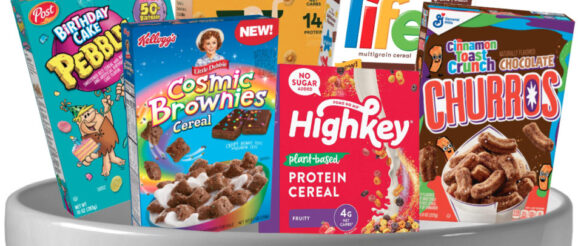Slideshow: A year in breakfast cereal innovation

KANSAS CITY — The global breakfast cereal market is forecast to grow to $60.07 billion in 2021 from $56.86 billion in 2020 at a CAGR of 5.6%, according to Research and Markets. The market is expected to reach $75.44 billion by 2025.
The ready-to-eat breakfast cereals category has been boosted by a surge in demand related to the coronavirus (COVID-19) pandemic, according to GlobalData, a London-based data and analytics company.
“With so many people now working from home instead of commuting, many consumers are no longer eating on-the-go or foodservice breakfasts,” said Ryan Whittaker, consumer analyst at GlobalData. “Instead, many consumers are falling back on a mixture of comforting and healthier options at home. Anxieties caused by uncertainty around the pandemic have produced a tendency to fall back on familiar branded products, especially ones that remind the consumer of their childhood.
“To many US consumers, breakfast cereals offer a way for them to impose order and familiarity on the day. For many, this can mean a moment of indulgence, revisiting a favorite from their childhood, or opting for a healthier option. The reduced demand for out-of-home consumption, reduced need to commute and heightened focus on health has convinced Americans to return to breakfast cereals in the morning.”
New nostalgic entries in the category this past year include Little Debbie Cosmic Brownies and Oatmeal Creme Pies cereals, Funfetti cereal and Dunkaroos cereal. Also, in December 2020, Kellogg Co. brought back its Smorz cereal, which first debuted in 2003. In September 2020, General Mills, Inc. brought back the ‘80s retro recipes for Cocoa Puffs, Golden Grahams, Cookie Crisp and Trix cereals.
“To many US consumers, breakfast cereals offer a way for them to impose order and familiarity on the day. For many, this can mean a moment of indulgence, revisiting a favorite from their childhood, or opting for a healthier option.” — Ryan Whittaker, GlobalData
“Our fans crave a taste of nostalgia — and, while these four cereals have always remained popular, we’ve answered their requests and brought back the taste they remember from childhood,” said Jennifer Jorgenson, vice president of marketing for General Mills cereal. “After all, was there anything better as a kid than waking up on Saturday morning, grabbing your favorite cereal and watching cartoons? We’re hoping fans can relive these fun moments while sharing the classic taste they loved with their own families now.”
Cereal innovation answering the call for indulgence this year includes Frosted Mini-Wheats Cinnamon Roll, Chocolate Strawberry Cheerios, Cinnamon Toast Crunch Chocolate Churros and Dunkin’ Cereal.
“Coffee and cereal are the ultimate breakfast go-tos, ranking as the top two most consumed items to help people start their day,” said Josh Jans, brand manager of Cereal Partnerships at Post Consumer Brands. “Dunkin’ coffee is a daily ritual for Americans, and we’re excited to be partnering with them to indulge their fans’ coffee cravings. Getting the flavor right on our new cereals was a top priority, and we think we’ve nailed the rich, smooth and creamy taste.”
Better-for-you breakfast cereals have also burgeoned over the past year, with many focused on plant-based protein and grain-free formulations. For example, Kellogg Co. in January unveiled Kashi GO Keto-Friendly Cereal.
“At Kashi, we believe in making eating well easy,” said Melanie Hall, director of brand marketing at Kashi. “We know that consumers are leaving traditional cereal behind to meet their evolving needs, adopting diets that limit sugar intake, increase protein content, and avoid grains. Our mission is to provide these consumers with a keto-friendly cereal that is nutritious, tasty, and is more affordable than other options on the market.”
Other innovation in the healthier cereal space includes HighKey Plant-Based Protein Cereal, Premier Protein cereal, Larabar Cereal, Seven Sundays Grain Free Cereal, Three Wishes cocoa grain-free cereal and Organic Sunflower Crisps cereal.
“The US breakfast cereal category is well-positioned to benefit during the pandemic,” Mr. Whittaker said. “Consumers want to purchase specialized items to aid their immune systems, to treat themselves or to recapture a sense of familiarity, and these products easily become staples for the daily routine during lockdown.”
